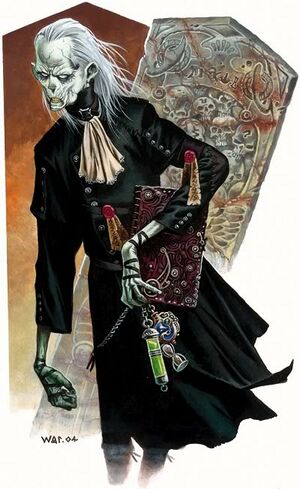Necropolitan

A Necropolitan is a sapient undead creature native to the world of Dungeons & Dragons. Introduced in the Dungeons & Dragons 3rd Edition splatbook "Libris Mortis", in can be thought of as a variation on the older lich concept; a living creature who voluntarily transforms themselves into an undead being in order to achieve immortality, but without the obvious physical degeneration of the lich or the endless predatory nature of the vampire or ghoul. Physically, they resemble whichever creature they were in life - which can be anything with the Humanoid or Monstrous Humanoid type - but with pale white hair, skin and eyes.
Notable in that they can explicitly be any alignment, and the given example is true neutral. Pretty much designed for PCs, as they have, effectively, LA +1 with instant buyoff.
The Template[edit]
“Necropolitan” is an acquired template that can be added to any humanoid or monstrous humanoid (referred to hereafter as the base creature). A necropolitan speaks any languages it knew in life, and it has all the base creature’s statistics and special abilities except as noted here.
- Size and Type: The creature’s type changes to undead, and it gains the augmented subtype. Do not recalculate base attack bonus, saves, or skill points. Size is unchanged.
- Hit Dice: Increase to d12.
- Special Qualities: A necropolitan retains all the special qualities of the base creature and gains those described below.
- Resist Control (Ex): Necropolitans have a +2 profane bonus on their Will saving throws to resist the effect of a control undead spell.
- Turn Resistance (Ex): A necropolitan has +2 turn resistance.
- Unnatural Resilience (Ex): Necropolitans automatically heal hit point damage and ability damage at the same rate as a living creature. The Heal skill has no effect on necropolitans; however, negative energy (such as an inflict spell) heals them.
- Abilities: Same as the base creature, except that as undead creatures, necropolitans have no Constitution score.
- Advancement: By character class.
- Level Adjustment: Same as the base creature. (Becoming a necropolitan involves losing a level—see Ritual of Crucimigration, below—so the advantages of the undead type cancel out what would other wise be a larger adjustment.)
Ritual of Crucimigration[edit]
Any living humanoid or monstrous humanoid can petition for consideration to undergo the Ritual of Crucimigration, which (if successful) enables the creature to become a necropolitan. The petition for consideration requires a fee of 3,000 gp and a written plea.
The Ritual: The first part of the ritual requires the placement of the petitioner on a standing pole. Cursed nails are used to affix the petitioner, and then the pole is lifted into place. The resultant excruciating pain that shoots like molten metal through the petitioner’s fingers and up the arms is not what finally ends the petitioner’s mortal life, however, since death usually comes from asphyxiation and heart failure. As petitioners feel death’s chill enter their bodies, many have second thoughts, but it is far too late to go back—the cursed nails and chanting of the ritual ensures that the Crucimigration is completed.
The ceremony that lasts for 24 hours—the usual time it takes for the petitioner to perish. During this period, two or three zombie servitors keep up a chant initiated by the ritual leader when the petitioner is first placed into position. Upon hearing the petitioner’s last breath, the ritual leader calls forth the names of evil powers and gods to forge a link with the Negative Energy Plane, and then impales the petitioner. Dying, the petitioner is reborn as a necropolitan, dead but animate.
Game Effect: Immediately upon opening its undead eyes, a new necropolitan loses a level as if the spell raise dead had been used on it and it was alive instead of animate. (If the subject has no levels to lose, it is simply destroyed.) It then also loses an additional 1,000 XP. If the loss of this much XP forces the necropolitan to lose another level, then it loses another level. No spell, not even restoration, can restore this lost XP. Petitioners may not spend experience points they don’t have—if the level loss and the 1,000 XP cost drains a creature to 0 XP or less, it is destroyed, turned to dust, and can never be raised or revived again using any means. If the ritual is interrupted before it is completed, the petitioner is merely dead.